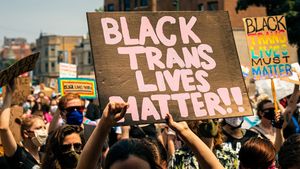A federal judge who struck down Ohio's constitutional prohibition on recognizing legal same-sex marriages performed in other states agreed Wednesday to place a hold on his ruling while the state appeals, reports Equality on Trial.
But the four same-sex couples who filed suit are exempt from that stay, meaning the state must recognize their existing marriages as legal. Ohio officials must immediately issue corrected birth certificates to each of the married same-sex couples, listing both spouses as the parents of each child, according to the Associated Press.
Last week Federal District Magistrate Timothy Black declared that Ohio's constitutional amendment forbidding the state from recognizing same-sex marriages performed in other jurisdictions violates the Due Process and Equal Protection clauses of the U.S. Constitution. The state's appeal of the landmark decision was expected, and Wednesday's announcement of the continued stay means that all other same-sex couples legally married in other states and living in Ohio will have to wait until a higher court decides whether the state is required to recognize those unions.
In his order granting the state's request for a stay, Judge Black cited several other pending marriage equality cases where federal district courts have delayed implementation of pro-equality rulings pending appeal, including those currently awaiting appeal in Utah, Kentucky, Virginia, Texas, and Oklahoma.
Black's decision made clear that he does not expect the state's arguments defending the voter-approved marriage recognition ban to survive additional judicial scrutiny and that he does not see any irreparable harm that will come to the state if it is forced to comply with the U.S. Constitution and recognize legal marriages performed in other jurisdictions.
However, he wrote, "the Court acknowledges that recognition of same-sex marriages is a hotly contested issue in the contemporary legal landscape, and, if Defendant [Ohio Attorney General Lance] Himes’s appeal is ultimately successful, the absence of a stay as to this Court’s ruling of facial unconstitutionality is likely to lead to confusion, potential inequity, and high costs. … Premature celebration and confusion do not serve anyone’s best interests. The federal appeals courts need to rule, as does the United States Supreme Court."
Indeed, many legal observers expect one — if not several — of the pending legal challenges to a state's constitutional marriage ban to reach the Supreme Court in the coming years. The constitutional challenge to Utah's marriage ban was heard in the 10th Circuit Court of Appeals in Denver last week, where the same three-judge panel will hear oral arguments in the Oklahoma marriage equality case Thursday. If pro-equality rulings in both those cases are upheld, most expect the states to appeal the decisions all the way to the U.S. Supreme Court.



























































































































